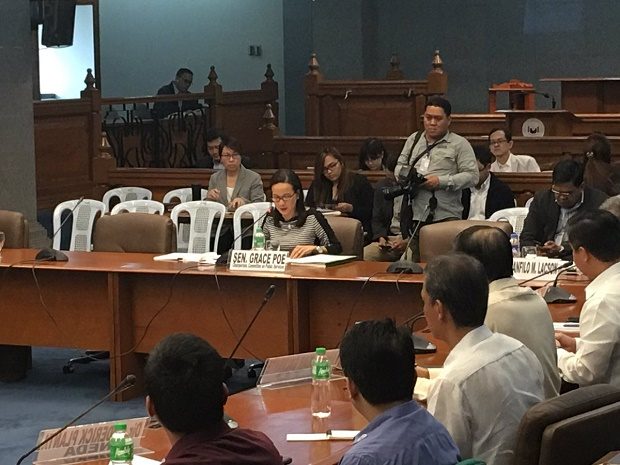
Sen. Grace Poe presides over the Senate hearing on proposed emergency powers. MAILA AGER/INQUIRER.net
The Senate is inclined to grant emergency powers to President Duterte, but the lawmakers said on Wednesday they wanted an interagency council to specifically outline how it would use the P1.3 trillion in proposed funds to solve the crippling road traffic in most urban areas.
Sen. Ralph Recto said he preferred that the traffic czar’s area of coverage be made clearer—or reduced for that matter—and that the source of the funds for the projects to be undertaken was spelled out.
“Congress is willing to provide those emergency powers. We know there’s a crisis. There’s a problem. But there should be focus,” Recto said in an interview following a Senate hearing on the matter. “I don’t think it should be nationwide.”
He was referring to the draft bill prepared by the Department of Transportation (DoTr), which calls for a “traffic czar” with powers to carry out projects nationwide in scope.
“The DoTr or government must be prepared when we give them powers. What do they do? Are they prepared? Many of their projects are just titles, no engineering development design, no feasibility study, and no funding in 2017,” Recto said.
He said the cost of the projects under the proposed emergency power bill was P1.3 trillion, while the DoTr proposed budget for 2017 was just P56.2 billion.
“I would prefer that the emergency powers are focused,” he said, referring to the broad coverage of jurisdiction of the traffic czar over land, air and sea. “Are they really ready for emergency powers? Have they thought this out?’
Committee on public services chair Sen. Grace Poe said she hoped the proposed law was passed by December. But she batted for stronger congressional veto powers that would no longer be strictly bound by procurement laws.
Poe said she was all for the bill’s intention of speeding up implementation of projects, particularly infrastructure.
But she clarified that P1.3 trillion in funds could not be spent in just a year, with projects expected to be completed in two or three years and could either be sourced from the General Appropriations Act or from private-public partnerships.
But Poe said she wanted to strengthen the congressional oversight function over contracts, where deals are subjected to a two-week review before they are signed.
Projects can be scrapped if they are not FOI (freedom of information) compliant, are not fiscally sound and if they are deemed not to be practical deliverables, she said.
Poe pointed out the provision on the oversight committee was not meant at slowing down the projects “but we also do not want to be robbed.”
“They should not think that emergency powers is a supplemental budget; it is not a supplemental budget,” Recto said.